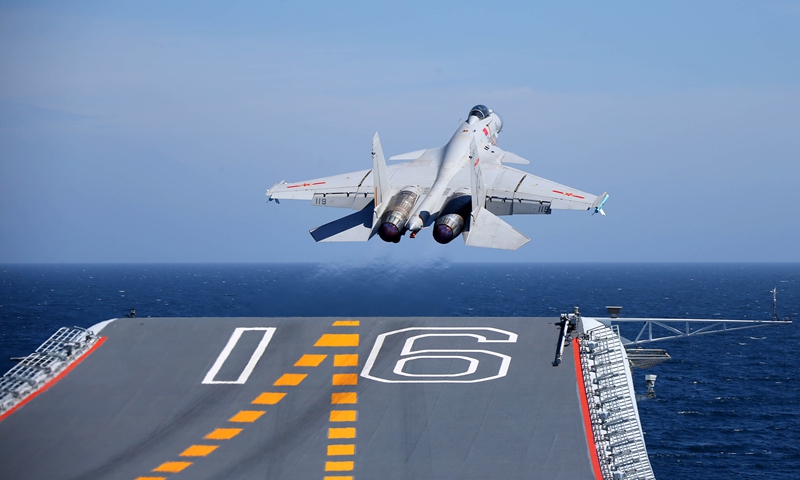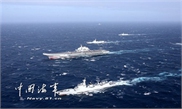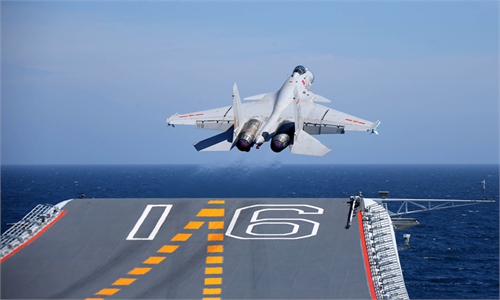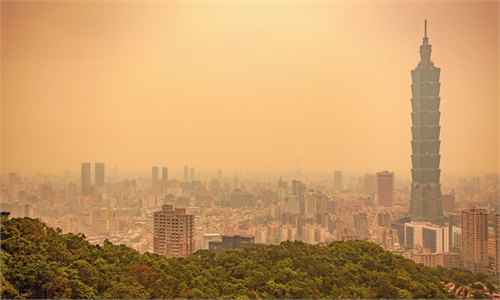
A J-15 carrier-borne fighter jet takes off from the flight deck of the aircraft carrier Liaoning during a maritime training exercise on July 1, 2017. The Chinese aircraft carrier Liaoning and its carrier strike group carried out realistic training in an undisclosed sea area on July 1, 2017. (eng.chinamil.com.cn/Photo by Li Tang
Joseph Wu Jaushieh, the island of Taiwan's leader of external affairs, said on Wednesday that the Chinese mainland's military threat to the island is increasing, and that US policymakers "clearly see the danger of the possibility of China launching an attack against Taiwan." He also said that the island would fight to the very last day if attacked by the Chinese mainland.
This was a rare statement of Taiwan authorities in the face of the risk of reunification by force. Apparently, Democratic Progressive Party (DPP) authorities have seen that they have pushed the cross-Straits situation into a dead end, with political and military antagonism spiraling upward. As they have destroyed the political preconditions for an ease of the situation, they have begun to fear the eventual breakout of a war.
The majority of people are willing to see the Taiwan Straits enjoy peace with both sides of the Straits jointly discussing the peaceful reunification. But there are two premises. First, island authorities must accept the one-China principle and make policies promoting cross-Straits integration rather than division. Second, they should keep a distance from US strategies to contain China, refraining from acting as a pawn.
However, the DPP has ruined both preconditions. Regional leader Tsai Ing-wen has refused to recognize the 1992 Consensus and the one-China principle. Tsai has thus put an end to the peaceful development of cross-Straits relations and brought the island to a dangerous route to confront the Chinese mainland. To secure their extreme policies, the DPP authorities have made mistakes repeatedly by cozying up to US' campaign to pressure the Chinese mainland. In this way, the DPP has tried to prove its indispensable value to US strategy in exchange for Washington's determination to "defend" the island.
This is a crazy road of no return. The Chinese mainland is growing stronger and more prosperous. How could the 1.4 billion Chinese people allow Taiwan to be separated from China in such a blatant way? What can be used for Taiwan to seek "independence?" The US in recent years mapped out its strategy to contain China and has played the "Taiwan card." The island of Taiwan, pleasing the US at the expense of its own interests, has rushed to build itself a frontline of the US' vicious China policy. How could there be such a mindless and stupid political team on the island?
If the DPP authorities continue their radical road and refuse to pull back before it's too late, they are doomed to be rooted out. It's only a matter of when and how.
Wu, to a large extent, was meant to make himself heard by the US and Japan, especially those radical anti-China forces in Washington, in an attempt to demand that they deter the mainland with greater efforts. However, the Taiwan authorities are too narrow-minded to figure out the general situation of China-US strategic competition. They tend to look up at the US, thus believing the mainland is in awe of Washington as they are. They are desperately silly.
The present-day China is different from what it was several decades ago. The balance of military power in the Taiwan Straits has fundamentally changed. The situation of China-US competition is also changing. In the past, the possibility of the US military intervening in a war in the Taiwan Straits could generate pressure on the mainland. But today, no matter how the US declares its determination to "defend Taiwan," it can no longer frighten the mainland. Peaceful unification is the mainland's goodwill. It's not a choice being forced to make under threat.
We despise those commitments the US has made to the island. We also believe our will to crack down on secessionists far outweighs Washington's will to "defend Taiwan." In extreme circumstance, our will to engage in a full-scale confrontation across the Taiwan Straits without hesitation will also be far greater than that of the US.
At the same time, we look down on Tsai authorities' clamor on "fight to the end." It is believed that Taiwan people will not support their authorities' radical policies that have no bottom line, nor are they willing to become cannon fodder. No one will help the DPP authorities in fighting to "the very last day."
Therefore, we offer the DPP authorities a piece of advice - facing the reality, making fundamental adjustments on its ruling policies, stepping out of the blind alley by themselves.
If they insist on taking chances and continue to be evil, and they will lose both time and opportunities, until a severe stalemate makes the situation uncontrollable. In the end, they will be condemned by history, and severely punished by the law of the People's Republic of China.



